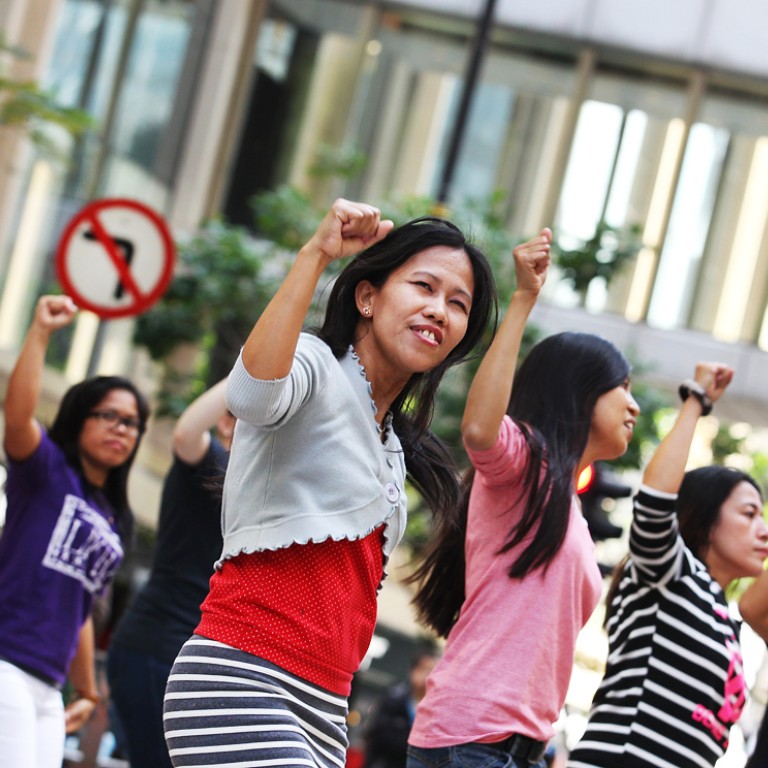
Filipino migrant workers in Hong Kong warned to stay away from Occupy Central protests
Foreign Affairs spokesman says the warning is for safety and that joining protests does not mean automatic deportation
Filipino nationals in Hong Kong were avoiding Occupy Central protests on the National Day holiday after receiving warnings that they could be jailed, fined or possibly even "deported".
Chater Garden and surrounding areas in Central are usually packed with Filipino workers on their days off – singing, dancing and having lunch together – but on Wednesday the crowd was considerably smaller.
Filipino domestic helpers on their day off have been avoiding the protest zones in Admiralty, Central, Causeway Bay, Mong Kok and Tsim Sha Tsui after the Philippine consulate issued a warning that it would be unsafe or possibly illegal to join the demonstrations.
Using more strongly worded language than other consulates, the Philippine Consulate General in its notice urged all its nationals to “avoid venues of these protest actions … to ensure your safety and avoid being inadvertently perceived as being part of the protest actions”.
It warned: “The Public Ordinance of Hong Kong SAR takes disorder in public areas seriously and anyone found guilty of an offence can be fined HK$5,000 and/or imprisoned for 12 months”.
Mary Rose Huad, a 36-year-old Filipino domestic helper who is avoiding the protests, confirmed the fine mentioned in the notice was a strong deterrent. “I don’t have HK$5,000!” she told the .
Huad added that her friends normally gathered in Central on their days off but decided to steer clear. There were some 166,700 Filipino domestic helpers in Hong Kong as of February, who are paid a minimum HK$4,100 per month – a HK$100 raise announced this week.
“Every Sunday we stay here. We’re only [staying away] now because we know it’s dangerous. We’re scared of the protest, of the [tear] gassing,” Huad said.
There are various offences under the public order ordinance, including ones that deem demonstrations of more than 30 people illegal if there is no permission from police. It also imposes sanctions on people who block traffic.
The ordinance applies to all Hong Kong residents, including foreigners who reside here.
Legal experts said the notice was not saying that participating in the protests was in itself illegal, but that the possibility of getting caught by police and being charged under the ordinance would affect a foreigner’s immigration status.
Ferdinand Ramos, a 38-year-old musician who has lived in Hong Kong all his life but goes back to the Philippines periodically, said media reports in his country had warned nationals not to join the protest because they could be deported.
Ramos said he was sure that would not happen because he had not seen any “disorder in a public area”.
In fact, Ramos said he was impressed with how organised and peaceful the protesters are here. “In the Philippines, sorry to say, in this kind of event, what you will see is: the bank is gone, the jewellery shop is gone, the iPhone shop is gone,” he said.
Philippine Department of Foreign Affairs spokesman Charles Jose also dismissed reports that Filipinos would be automatically deported if they joined the protests.
“If a Filipino is caught by police in the protests and found breaking the law, “we can only imagine that after serving time, they will be asked to leave Hong Kong. That is something we can assume. But I’m not saying that they will be deported,” Jose told the on Wednesday.
“Our primary concern is the safety of Filipino workers. We don’t like them to be in demonstrations. If something happens, we don’t want them to get hurt,” he said.
“We don’t want them to participate in protests because we’re not directly concerned with issues being discussed between Hong Kong and China.”
Ramos, the musician, said he was getting anxious messages from his family, who heard the deportation warnings.
“That’s what I’m trying to explain because all of my Filipino friends are so afraid,” he said. “When I say I’m going there, they all say ‘Ferdie’, are you sure? [But] it’s fine!”
